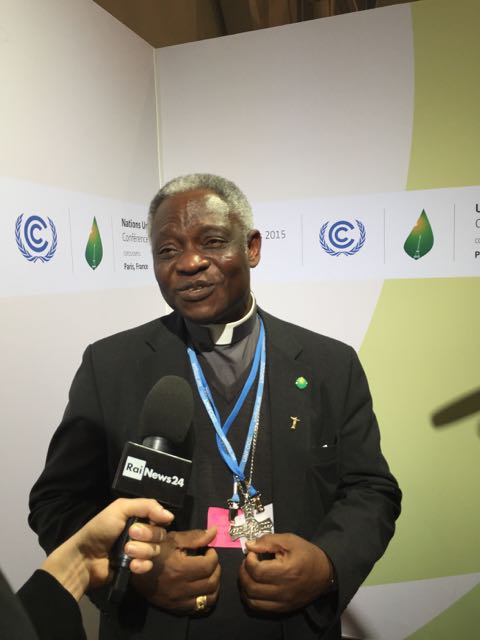Behind the Vatican’s puzzling initial stance on climate goal
PARIS—Cardinal Peter Turkson, the papal envoy to the climate change negotiations being held in this city, told reporters the role of the Vatican as an observer state of the 21st Conference of Parties (COP21) meeting under the UN Framework Convention on Climate Change was to serve as a conscience, reminding the parties of the virtues of solidarity with fellow humans and compassion for the poor and vulnerable.
He offered a vivid illustration of the conditions the climate vulnerable suffer: the figure of a person “strapped to a coconut tree” to survive a battering storm. However, despite a specific request from some delegations to issue a statement supporting the more ambitious target of 1.5 degrees—a lower cap on the rise of global average temperature from pre-industrial levels—Turkson used his statement at the ministerial dialogue to promote the less ambitious option: “We come back together to make this conscience bear fruit, fruit that will last, namely a commitment to curb carbon emission to well under 2 degrees.”
In both prepared statements and in follow-on interviews, Turkson championed the cause of small island states and other countries already suffering from the visible consequences of climate change. He used the image of the person strapped to a coconut tree more than once, to demonstrate the need for compassion for the vulnerable.
But both the Climate Vulnerable Forum and the Alliance of Small Island States are pushing for “below 1.5.” Why isn’t the Vatican, an important influence despite its negligible carbon footprint, supporting the 1.5 goal?
“We say 2 AND,” Turkson told INQUIRER.net, “2 and below—can even be further than 1.5.”
Article continues after this advertisementIn other words, “well under 2 degrees” was a negotiating stance, rather than a moral position.
Article continues after this advertisement“The thing is this. Here, it’s all a question of negotiation. If you say 1.5, somebody who’s made up his mind to stick with 2 can say he’s not gonna come to [1.5], is no go for me. We said 2 and below, 2 and below, and it can go even below that.”
He continued:
“But the essential thing that I add is that when we even talk about 2 or 1.5 we should commit to decarbonization. That is important. The 1.5 or 2 is not a magic formula. You can accept this but if it’s not accompanied by [a] program of decarbonization, this cannot be realized.”
The Pontifical Academy of Sciences, an international, independent, and non-sectarian college that advises the pope, recommended the strategy.
“The inspiration of the Pontifical Academy is just what I said. They’re the ones who are recommending that we should rather talk about ‘2 and below.’ Its their recommendation … It’s also they who are telling me that if we say 1.5 or even 1, and there’s not a commitment to decarbonisation by the middle of this century, we still don’t make it.”
The “clean” text of the draft Paris agreement on curbing greenhouse gas emissions offers three options for the global average temperature goal: below 2, well below 2 with a reference to 1.5, and below 1.5. This new menu of options was prompted by what the ministers of Norway and St. Lucia said at a meeting of the Comite de Paris:
“On the long-term temperature goal, we have identified a will by most Parties to somehow reflect the 1.5 °C temperature limit in the Purpose of the Agreement.”
